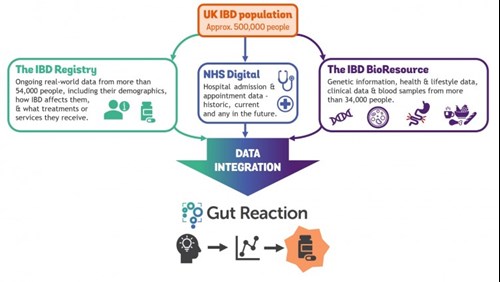Gut Reaction is a research project that brings together health data from thousands of people living with Crohn’s and Colitis across the UK so we can carry out research to improve the lives of people living with the conditions, faster.
Gut Reaction
Health Data Research UK - the national institute for data science - is funding a set of health data ‘hubs’, and Gut Reaction is one of them. These hubs aim to develop specialist expertise, tools, and ways of working to maximise on the insights and innovations across different fields of health data research.
Gut Reaction is a partnership, led by Cambridge University Hospitals NHS Foundation Trust in collaboration with:
- Data resources (the IBD Registry and IBD BioResource)
- Participating NHS hospitals
- Industry
- Patient organisations, such as Crohn’s & Colitis UK
- Most importantly, people living with Crohn’s and Colitis
By working together, Gut Reaction is creating a unique, secure data resource to support research that can improve the lives of people living with Crohn’s and Colitis and maybe even work towards a cure.
Where does the data come from?
Gut Reaction builds on the high-quality health data from participants in the IBD BioResource by combining it with ‘real-world’ data from the IBD Registry and participating NHS hospitals via NHS Digital.

By bringing together and integrating this data for the first time, Gut Reaction creates a really powerful resource to support important research into Crohn’s and Colitis.
All data is stored safely and securely, and de-identified in the process. Only trusted researchers can access the data held by Gut Reaction through what we call a secure ‘Trustworthy Research Environment’. Importantly, all requests are assessed and approved by a panel of experts, including experts through lived experience – patients.
Making sure that Gut Reaction works for people living with Crohn's and Colitis
Health data is very private information, and it is essential that the data in Gut Reaction are held securely to protect people’s privacy.
We know that this type of ‘big data’ analysis is an area of real concern to the Crohn’s and Colitis community, as well as the wider public – How can we know our information will be kept safely? Who will be able to access it and why? How are we asked about giving our information?
Our Patient Advisory Committee – made up of people with Crohn’s Disease or Ulcerative Colitis – was created at the outset of the project to address these questions and integrate patient voices into our practises and policies. Public involvement is central to Gut Reaction and people with Crohn’s and Colitis will be involved in every step of the way. You can read more about this, as well as an interview with two of our Committee members in our blog.
How are Crohn’s & Colitis UK involved?
Crohn’s & Colitis UK are partners in Gut Reaction to keep the patient perspective at the heart of this project. To ensure even more of a focus on patients needs and experiences, one of our research champions is involved with the project, and you can find out more about their role on our research champions page.
We are supporting the Patient Advisory Committee and ensuring that their decisions are implemented across the following areas:
- Patient-facing information sheets
- Consent forms
- The criteria that researchers need to meet to be able to access data
- How patients should be involved the decisions about who can access the data
How can I take part?
Gut Reaction lets people with Crohn’s and Colitis take part in research – how? By getting involved in two projects:
- The IBD BioResource is a research resource that helps people with Crohn’s and Colitis take part in studies that may be appropriate to them. You can sign up at your nearest participating hospital with a straightforward health questionnaire and a simple blood test. Next time you’re at an appointment, ask your IBD Team if you can join and take part.
- The IBD Registry is another database, but it holds different data. That’s why it needs to come together with the IBD BioResource as part of Gut Reaction – so we can see a fuller picture.
You can sign up at your nearest participating hospital by giving your hospital team consent to share information about your Crohn's or Colitis with the IBD Registry. Soon, you’ll be able to sign up to the IBD Registry yourself – you’ll sign a consent form and fill out information about your condition yourself. This is an important next step to help you feel empowered and in control of your data. In the meantime, you can speak to your IBD team about whether your hospital is participating in the Registry.
Signing up to both the IBD BioResource and the IBD Registry means there’s an opportunity be called back to take part in more research. This could be a survey, further tests or even a trial.
By securely sharing your health data through Gut Reaction, you’ll be making a huge difference, helping us work towards our vision of a world free from Crohn’s and Colitis.
Want to get involved in research?
The best quality research happens when people with Crohn's and Colitis are involved, and you can make a difference at every stage of research.

About Crohn's and Colitis
Ways to get involved
Helpline Service
We know it can be difficult to live with, or support someone living with these conditions. But you’re not alone. We provide up-to-date, evidence-based information and can support you to live well with Crohn’s or Colitis.
Our helpline team can help by:
-
Providing information about Crohn’s and Colitis.
-
Listening and talking through your situation.
-
Helping you to find support from others in the Crohn’s and Colitis community.
-
Providing details of other specialist organisations.

Please be aware we’re not medically or legally trained. We cannot provide detailed financial or benefits advice or specialist emotional support.
Please contact us via telephone, email or LiveChat - 10am to 3pm, Monday to Friday (except English bank holidays).
If you need specific medical advice about your condition, your GP or IBD team will be best placed to help.
